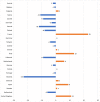Regulation and Trust: 3-Month Follow-up Study on COVID-19 Mortality in 25 European Countries
- PMID: 32301734
- PMCID: PMC7184967
- DOI: 10.2196/19218
Regulation and Trust: 3-Month Follow-up Study on COVID-19 Mortality in 25 European Countries
Abstract
Background: The outbreak of the coronavirus disease (COVID-19) has dramatically changed societies in 2020. Since the end of February, Europe has been hit particularly hard by COVID-19, but there are major country differences in both the spread of the virus and measures taken to stop the virus. Social psychological factors such as institutional trust could be important in understanding the development of the epidemic.
Objective: The aim of this study was to examine country variations of COVID-19 mortality in Europe by analyzing social risk factors explaining the spread of the disease, restrictions and control measures, and institutional trust.
Methods: The present study was based on a background analysis of European Social Survey data on 25 European countries (N=47,802). Multilevel mixed effects linear regression models focused on 84 days of the COVID-19 epidemic (January 22 to April 14, 2020) and modelled the daily COVID-19 mortality. Analysis focused on the impact of social relations, restrictions, and institutional trust within each country.
Results: The spread of the COVID-19 epidemic has been fast everywhere, but the findings revealed significant differences between countries in COVID-19 mortality. Perceived sociability predicted higher COVID-19 mortality. Major differences between the 25 countries were found in reaction times to the crisis. Late reaction to the crisis predicted later mortality figures. Institutional trust was associated with lower COVID-19 mortality.
Conclusions: The analyses demonstrated the importance of societal and social psychological factors in the spread of the COVID-19 epidemic. By considering multiple perspectives, this study showed that country differences in Europe are major, and this will have an impact on how countries will cope with the ongoing crisis in the following months. The results indicated the importance of timely restrictions and cooperation with people.
Keywords: Europe; infectious diseases; mortality; prevention; sociability; trust.
©Atte Oksanen, Markus Kaakinen, Rita Latikka, Iina Savolainen, Nina Savela, Aki Koivula. Originally published in JMIR Public Health and Surveillance (http://publichealth.jmir.org), 24.04.2020.
Conflict of interest statement
Conflicts of Interest: None declared.
Figures




Similar articles
-
Mortality impacts of the coronavirus disease (COVID-19) outbreak by sex and age: rapid mortality surveillance system, Italy, 1 February to 18 April 2020.Euro Surveill. 2020 May;25(19):2000620. doi: 10.2807/1560-7917.ES.2020.25.19.2000620. Euro Surveill. 2020. PMID: 32431289 Free PMC article.
-
COVID-19 in Italy: impact of containment measures and prevalence estimates of infection in the general population.Acta Biomed. 2020 Apr 10;91(3-S):175-179. doi: 10.23750/abm.v91i3-S.9511. Acta Biomed. 2020. PMID: 32275287 Free PMC article.
-
Geographic risk assessment of COVID-19 transmission using recent data: An observational study.Medicine (Baltimore). 2020 Jun 12;99(24):e20774. doi: 10.1097/MD.0000000000020774. Medicine (Baltimore). 2020. PMID: 32541529 Free PMC article.
-
The potential long-term impact of the COVID-19 outbreak on patients with non-communicable diseases in Europe: consequences for healthy ageing.Aging Clin Exp Res. 2020 Jul;32(7):1189-1194. doi: 10.1007/s40520-020-01601-4. Epub 2020 May 26. Aging Clin Exp Res. 2020. PMID: 32458356 Free PMC article. Review.
-
Psychological health during the coronavirus disease 2019 pandemic outbreak.Int J Soc Psychiatry. 2020 Aug;66(5):512-516. doi: 10.1177/0020764020925835. Epub 2020 May 21. Int J Soc Psychiatry. 2020. PMID: 32434402 Free PMC article. Review.
Cited by
-
Trust levels toward health care and government: insights from TrustMe, an Italian cross-sectional study.J Prev Med Hyg. 2024 Aug 31;65(2):E125-E133. doi: 10.15167/2421-4248/jpmh2024.65.2.3231. eCollection 2024 Jun. J Prev Med Hyg. 2024. PMID: 39430985 Free PMC article.
-
Social media trust predicts lower COVID-19 vaccination rates and higher excess mortality over 2 years.PNAS Nexus. 2023 Oct 4;2(10):pgad318. doi: 10.1093/pnasnexus/pgad318. eCollection 2023 Oct. PNAS Nexus. 2023. PMID: 37841324 Free PMC article.
-
Canadians' trust in government in a time of crisis: Does it matter?PLoS One. 2023 Sep 8;18(9):e0290664. doi: 10.1371/journal.pone.0290664. eCollection 2023. PLoS One. 2023. PMID: 37682915 Free PMC article.
-
Evaluation of the Global Health Security Index as a predictor of COVID-19 excess mortality standardised for under-reporting and age structure.BMJ Glob Health. 2023 Jun;8(7):e012203. doi: 10.1136/bmjgh-2023-012203. BMJ Glob Health. 2023. PMID: 37414431 Free PMC article.
-
Factors associated with COVID-19 fatality among patients admitted in Mashonaland West Province, Zimbabwe 2020-2022: a secondary data analysis.Pan Afr Med J. 2023 Mar 21;44:142. doi: 10.11604/pamj.2023.44.142.37858. eCollection 2023. Pan Afr Med J. 2023. PMID: 37396695 Free PMC article.
References
-
- Spiteri G, Fielding J, Diercke M, Campese C, Enouf V, Gaymard A, Bella A, Sognamiglio P, Sierra Moros MJ, Riutort AN, Demina YV, Mahieu R, Broas M, Bengnér M, Busa S, Schilling J, Filleul L, Leopoutre A, Saura C, Mailles A, Levy-Bruhl D, Coignard B, Bernard-Stoecklin S, Behillil S, van der Werf S, Valette M, Lina B, Riccardo F, Nicastri E, Casas I, Larrauri A, Salom CM, Pozo F, Maksyutov RA, Charlotte M, Van Ranst M, Bossuyt N, Lotta S, Sane J, Tegmark-Wisell K, Palmérus M, Broberg EK, Beauté J, Jorgensen P, Bundle N, Pereyaslov D, Adlhoch C, Pukkila J, Pebody R, Olsen S, Ciancio BC. First cases of coronavirus disease 2019 (COVID-19) in the WHO European Region, 24 January to 21 February 2020. Euro Surveill. 2020 doi: 10.2807/1560-7917.es.2020.25.9.2000178. - DOI - PMC - PubMed
-
- Liu Y, Gayle A, Wilder-Smith A, Rocklöv J. The reproductive number of COVID-19 is higher compared to SARS coronavirus. J Travel Med. 2020 Mar 13;27(2) doi: 10.1093/jtm/taaa021. http://europepmc.org/abstract/MED/32052846 - DOI - PMC - PubMed
-
- Zhou F, Yu T, Du R, Fan G, Liu Y, Liu Z, Xiang J, Wang Y, Song B, Gu X, Guan L, Wei Y, Li H, Wu X, Xu J, Tu S, Zhang Y, Chen H, Cao B. Clinical course and risk factors for mortality of adult inpatients with COVID-19 in Wuhan, China: a retrospective cohort study. Lancet. 2020 doi: 10.3410/f.737524760.793572688. - DOI - PMC - PubMed
MeSH terms
LinkOut - more resources
Full Text Sources
Miscellaneous

